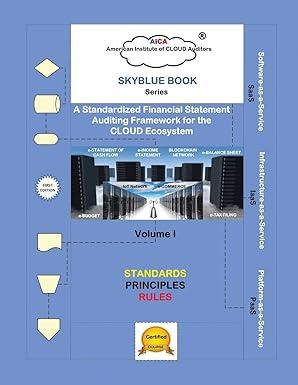Question
Ethics in the Accounting Profession The earnings numbers are associated with important economic consequences for share prices in the capital markets. In addition, financial statement
Ethics in the Accounting Profession
The earnings numbers are associated with important economic consequences for share prices in the capital markets. In addition, financial statement information has a number of additional economic consequences. For example, financial statement information commonly affects a companys ability to borrow, enabling a financially healthy company to raise capital from creditors or pushing a distressed company into bankruptcy. In addition, the financial performance of a company, particularly in generating revenues and earnings, will impact employees compensation and bonuses. Because of these consequences, accountants face intense pressure to behave with the highest level of professional ethics.
The pressure on accountants and auditors to apply GAAP in a biased way in order to present a company in a favorable light can be very strong. Likewise, the pressure on accountants and auditors to avoid reporting negative information (such as a decrease in earnings or negative earnings) can be intense. The professional accountant must realize that we serve the greater good of society and owe a responsibility of ethics and fairness to all current and potential stakeholders that depend on the information we produce. As ethical accountants, we create tremendous social welfare by producing reliable and relevant information for decision makers. If we act as unethical accountants, we destroy social welfare and can do great harm to innocent stakeholders who are misled by our unreliable information.
There are many situations in which accountants face ethical dilemmas, situations in which an accountant must make a decision about what is the right (ethical) action to take in given circumstances. Because accounting is a professional service that plays an important role in society, professional accounting organizations have established codes of ethics for their members. Members of the AICPA recognize that they have an obligation of self-discipline above and beyond the requirements of laws and regulations. To help guide members in performing their responsibilities in public practice, industry, government, and education, the AICPA adopted the Code of Professional Conduct (CPC).
The CPC includes six principles that express the basic tenets of ethical and professional conduct and call for an unswerving commitment to honorable behavior, even at the sacrifice of personal advantage. The following exhibit summarizes these principles.

Ethical Dilemma
Suppose you are the accountant of Western Bank & Trust. At the end of 2017, your company purchased land and a building for the lump sum of $3,000,000. To get the maximum tax deduction, your boss asks you to allocate 90% of the purchase price to the building and only 10% to the land. A more realistic allocation would have been 70% to the building and 30% to the land.
Requirements
Please prepare a short memo (one page, double-spaced) to state your opinion. Please include the following in your memo:
Explain the tax advantage of allocating too much to the building and too little to the land.
Is your bosss request ethical? If so, state why. If not, why not? Identify who would be harmed.
Principles of the AICPA Code of Professional Conduct . Responsibilities: In carrying out their responsibilities as professionals, members Il. The Public Interest: Members should act in a way that will serve the public inter- II. Integrity: To maintain and broaden public confidence, members should perform IV. Objectivity and Independence: A member should be objective and free from should exercise sensitive professional and moral judgments in all their activities. est, honor the public trust, and demonstrate commitment to professionalism all professional responsibilities with the highest sense of integrity conflicts of interest in discharging professional responsibilities. A member in public practice should be independent in fact and appearance when providing auditing and other attestation services. V. Due Care: A member should observe the profession's technical and ethical stand ards, strive continually to improve competence and the quality of services, and dis- charge professional responsibility to the best of the member's ability VI. Scope and Nature of Services: A member in public practice should observe the Principles of the CPC in determining the scope and nature of services to be provided
Step by Step Solution
There are 3 Steps involved in it
Step: 1

Get Instant Access to Expert-Tailored Solutions
See step-by-step solutions with expert insights and AI powered tools for academic success
Step: 2

Step: 3

Ace Your Homework with AI
Get the answers you need in no time with our AI-driven, step-by-step assistance
Get Started


